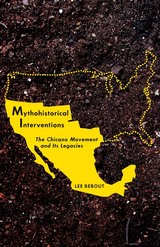3 books about Its Legacies

Mythohistorical Interventions
The Chicano Movement and Its Legacies
Lee Bebout
University of Minnesota Press, 2010
Mythohistorical Interventions explores how myth and history impacted the social struggle of the Chicano movement and the postmovement years. Drawing on archival materials and political speeches as well as music and protest poetry, Lee Bebout scrutinizes the ideas that emerged from the effort to organize and legitimize the Chicano movement’s aims.
Examining the deployment of the Aztec eagle by the United Farm Workers union, the poem Yo Soy Joaquín, the document El Plan de Santa Barbara, and icons like La Malinche and La Virgen de Guadalupe, Bebout reveals the centrality of culture to the Chicano movement. For Bebout, the active implementation of cultural narrative was strategically significant in several ways. First, it allowed disparate movement participants to imagine themselves as part of a national, and nationalist, community of resistance. Second, Chicano use of these narratives contested the images that fostered Anglo-American hegemony.
Bringing his analysis up to the present, Bebout delineates how demographic changes have, on the one hand, encouraged the possibility of a panethnic Latino community, while, on the other hand, anti-Mexican nativists attempt to resurrect Chicano myths as a foil to restrict immigration from Mexico.
[more]

Nazi-Looted Art and Its Legacies
Andreas Huyssen, Anson Rabinbach, and Avinoam Shalem, special issue editors
Duke University Press, 2017
This issue examines the legacy of Nazi-looted art in light of the 2012 discovery of the famous Hildebrand Gurlitt collection of stolen artwork in Germany. When the German government declassified the case almost two years later, the resulting scandal raised fundamental questions about the role of art dealers in the Third Reich, the mechanics of the Nazi black market for artwork, the shortcomings of postwar denazification, the failure of courts and governments to adjudicate stolen artwork claims, and the unwillingness of museums to determine the provenance of thousands of looted pieces of art. The contributors to this issue explore the continuities of art dealerships and auction houses from the Nazi period to the Federal Republic and take stock of the present political and cultural debate over the handling of this artwork.
Special topic contributors. Konstantin Akinsha, Meike Hoffmann, Andreas Huyssen, Lawrence M. Kaye, Olaf Peters, Jonathan Petropoulos, Anson Rabinbach, Avinoam Shalem, Julia Voss, Amy Walsh
Special topic contributors. Konstantin Akinsha, Meike Hoffmann, Andreas Huyssen, Lawrence M. Kaye, Olaf Peters, Jonathan Petropoulos, Anson Rabinbach, Avinoam Shalem, Julia Voss, Amy Walsh
[more]

Painting US Empire
Nineteenth-Century Art and Its Legacies
Maggie M. Cao
University of Chicago Press, 2025
A fresh look at the global dimensions of US painting from the 1850s to 1898.
Painting US Empire is the first book to offer a synthetic account of art and US imperialism around the globe in the nineteenth century. In this work, art historian Maggie M. Cao crafts a nuanced portrait of nineteenth-century US painters’ complicity and resistance in the face of ascendant US imperialism, offering eye-opening readings of canonical paintings: landscapes of polar expeditions and tropical tourism, still lifes of imported goods, genre painting, and ethnographic portraiture. Revealing how the US empire was “hidden in plain sight” in the art of this period, Cao examines artists who both championed and expressed ambivalence toward the colonial project. She also tackles the legacy of US imperialism, examining Euro-American painters of the past alongside global artists of the present. Pairing each chapter with reflections on works by contemporary anticolonial artists including Maria Thereza Alves, Tavares Strachan, Nicholas Galanin, Yuki Kihara, and Carlos Martiel, Cao addresses current questions around representation, colonialism, and indigeneity. This book foregrounds an overlooked topic in the study of nineteenth-century US art and illuminates the ongoing ecological and economic effects of the US empire.
Painting US Empire is the first book to offer a synthetic account of art and US imperialism around the globe in the nineteenth century. In this work, art historian Maggie M. Cao crafts a nuanced portrait of nineteenth-century US painters’ complicity and resistance in the face of ascendant US imperialism, offering eye-opening readings of canonical paintings: landscapes of polar expeditions and tropical tourism, still lifes of imported goods, genre painting, and ethnographic portraiture. Revealing how the US empire was “hidden in plain sight” in the art of this period, Cao examines artists who both championed and expressed ambivalence toward the colonial project. She also tackles the legacy of US imperialism, examining Euro-American painters of the past alongside global artists of the present. Pairing each chapter with reflections on works by contemporary anticolonial artists including Maria Thereza Alves, Tavares Strachan, Nicholas Galanin, Yuki Kihara, and Carlos Martiel, Cao addresses current questions around representation, colonialism, and indigeneity. This book foregrounds an overlooked topic in the study of nineteenth-century US art and illuminates the ongoing ecological and economic effects of the US empire.
[more]
READERS
Browse our collection.
PUBLISHERS
See BiblioVault's publisher services.
STUDENT SERVICES
Files for college accessibility offices.
UChicago Accessibility Resources
home | accessibility | search | about | contact us
BiblioVault ® 2001 - 2024
The University of Chicago Press









